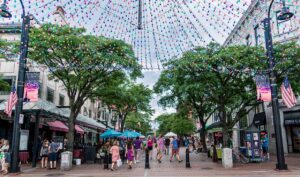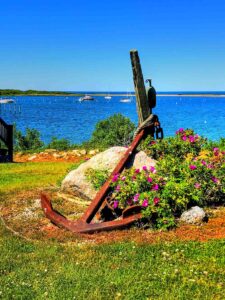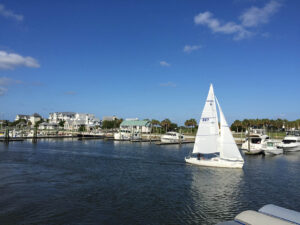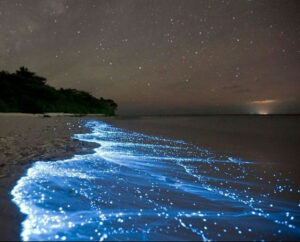ONE OF THE GREAT pleasures of boating is that you can explore the myriad destinations that line our nation’s coasts—from tiny little time-forgotten hamlets to the booming metropolises that were shaped by their presence along harbors, rivers, and oceans. For centuries, New York city has drawn adventure seekers from across the globe—merchants looking for new outlets for their wares, financiers eager to tap into one of the most robust markets in the world, tourists hoping to experience the urban jungle’s inimitable energy, if only for a few days. For contemporary cruisers, Manhattan has as many treasures and surprises to share as ever, and its lower west side is a fascinating mix of historic neighborhoods and vibrant, newly emerging districts. In this article we’ll explore two downtown westside areas ripe for exploration. Dive in, and you will not be disappointed.
Financial District
The tragedy of 911 and the destruction of the two towers that comprised the World Trade Center rocked New York City’s Financial District—the World Trade Center was the defining architectural presence that anchored that neighborhood for decades, and its obliteration left the area bereft, physically as well as emotionally. There was confusion and uncertainty as a plan for moving forward was painstakingly mapped out, with many false starts. Finally enough decisions were made and enough building happened, and the area has now come roaring back to life.
One don’t-miss site in this district is, of course, the haunting and deeply moving 9/11 Memorial Museum. There is an actual museum building, with exhibitions about the before, during, and after status of the site. It is a poetic, thought-provoking tribute to perhaps the most singularly harrowing event in contemporary American history. Most visitors move through it slowly, taking their time, lingering, reflecting. But save time and energy for visiting the outdoor space designed to commemorate the events of 9/11 in a more poetic, abstract way. Much like Maya Lin’s extraordinary Vietnam Veterans Memorial in Washington, D.C., the two flowing pools that echo the original footprints of the Twin Towers—designed by acclaimed Israeli-American architect Michael Arad—invite visitors to go deeper, and without the prescriptive narratives of a conventional museum exhibition, this outdoor portion of the memorial site is a beautiful invitation to connect with the resonant emotions of the event that the site honors and evokes.
The best indicator that, despite the tragedy of 9/11, America in general and New York in particular have come roaring back to life, is everything else that has sprung up in the Financial District in that day’s wake. One World Trade Center is the building that now defines the neighborhood’s rejuvenation. The faceted, column-like building, designed by the legendary firm Skidmore, Owings & Merrill, is now the tallest building in the western hemisphere and stands as a beacon of rejuvenation in this neighborhood that not too long ago was utterly devastated. Hop on an elevator and in 60 seconds shoot to the observation deck at the top of the building for unprecedented views of New York Harbor and beyond.
But wait, there’s more. Brookfield Place is a just-opened shopping and dining complex featuring outposts of leaders in world luxury such as Burberry, Gucci, and Tory Burch. The food offerings highlight some of the best, most authentic dining experiences currently available in Manhattan, plus Le District, a French-style food hall that is the provisioning destination of your dreams.
And if you’re a boat lover who has already visited New York City, chances are you’ve checked out South Street Seaport, the historic district that contains some of Manhattan’s oldest buildings and is an ode to the city’s seafaring past. The destination bears repeat visits, as it is now being helmed by a visionary board bent on retaining that historic spirit while making the location fully alive and vibrant for today.
Chelsea/ Meatpacking District
For New Yorkers, there’s some confusion these days about what defines the two adjacent districts of the Meatpacking District and Chelsea, as both these neighborhoods continue to explode and their boundaries continue to merge.
This fuzziness has perhaps in part been fostered by the construction of the High Line, a dreamy, mind-blowing new park that has transformed a derelict and forsaken stretch of elevated industrial rail line into a game-changing new urban space. Stretching from Gansevoort Street to West 34th Street and created by an all-star roster of designers that includes the architecture firm Diller Scofidio + Renfro and Dutch gardener Piet Oudolf, the park opened in stages and spurred exuberant development all along the way in its wake.
The High Line can be accessed by a number of staircases along its path and is open from sunrise to sunset. There is no bad time for a stroll, but the most magical moments are perhaps right when the park opens and right before it closes—the crowds haven’t gathered yet and you’ll have the space to yourself as you wander along this magical old rail line, much of the track still visible, surrounded by native grasses and wildflowers, and with the river and city flowing around you on every side. It is a completely unique experience, as if you are floating above an urban wonderland.
Another huge draw for the area is the just-opened new facility for the Whitney Museum of American Art. The Whitney is a beloved New York City institution, with a stellar collection, and for decades it was housed on the Upper East Side. Its new quarters are gleaming, designed by the world-renowned starchitect Renzo Piano. No matter where the museum decided to site itself, it would be a draw. The fact that it now occupies a stretch near the High Line makes this part of the city a must-visit destination.
These two neighborhoods represent just the tiniest, tiniest tip of the Manhattan iceberg. Which is great news. Because it means you can make New York City one of your regular cruising destinations. It will always have new secrets and treasures to share.
Where to Dine
- Fraunces Tavern (54 Pearl Street, 212-968-1776) George Washington ate here. For real. He even used it as a site for peace negotiations with the British. The 1762-era eatery is a National Landmark and has been welcoming hungry diners for centuries, and is as warm and captivating as ever. The menu is full of fresh takes on tavern fare, and the beer, wine, and liquor lists are deep and enticing. There is a fascinating museum upstairs.
- L’Appart (255 Liberty Street, 212-981-8577) This brand new space has been getting tons of accolades from New York City press and diners. It echoes the experience of eating in someone’s home, and has a French-driven menu that changes constantly depending on what is in season.
- Txikito (332 W. 29th Street, 212-242-4730) Alex Raij and Eder Montero are a wife-husband team who are among the city’s most lauded chefs. They are dedicated to Spanish cuisine, and to interpreting it in smart, authentic, accessible ways. Txikito is their ode to Basque cuisine.
- Cookshop (156 Tenth Avenue, 212-924-4440) A warm, welcoming space with excellent seasonal menus that feature American fare cooked with a rustic yet refined approach. This place is unbeatable any time of the day, whether you’re looking for the best Bloody Marys at brunch or a sophisticated, hip spot for dinner.
Where to Dock
- Liberty Landing Marina – located on the lower Hudson River in Jersey City, the full service, 520 slips marina offers two onsite restaurants, 24-hour fueling, and marine store.
- MarineMax at Chelsea Pier -located in the Chelsea Piers Sports and Entertainment Complex, the marina can accommodate vessels up to 300 feet with an onsite state-of-the-art fitness center, driving range, and day spa.
- Newport Yacht Club & Marina – situated on New York Harbor in Jersey City, the modern marina offers 154 slips for vessels up to 200 feet with service facilities onsite.
- North Cove Marina – officially opened as of May 2016, the 32 slip marina can accommodate vessels and 24/hour security.





